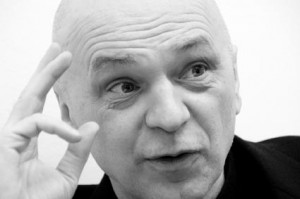Interview with Bernhard Lang

In the first of a series of interviews by postgraduate students with eminent composers who are coming to visit us at Southampton Máté Szigeti asks Austrian composer Bernhard Lang some questions:
Máté Szigeti (MS): The first word that comes to mind while listening to your music is intensity. A sort of intensity which is familiar for me from my past encounter with trash metal bands’ playing. A trash metal song very unlikely lasts for more than 5 minutes, whereas your pieces are generally longer than this average. What are your strategies to keep alive this intensity throughout a more extended time? Another related question: how do you plan? How do you start to work on a piece?
Bernhard Lang (BL): Intensity is a goal, and also the condition for the writing state I try to put myself into. Longer durations work more on the hypnosis effect, transgressing time by some sort of maelstrom pull; I always loved records with one number per side, or one on both sides.
MS: With your loop-technique you attempt to break up the linearity (or how you put it: the narrative structure) of music. Linearity however, seems to me a primordial feature of music: listeners are thought to interpret a form as a linear process of changes, where nothing can really be circular, inverse, or vertical. (At least, on the level of perception.) Do you think the learnt method of listening can be an obstacle to understanding your concept?
BL: No, circular structures trigger a different neurological reaction, addressing the trance centres in our brains, so (if it works at all) it should work by itself, not by interpretation.
MS: Dream-speech, automatic writing, improvisation tends to be (or used to be?) departing point for your works. What do you think about the origin of thoughts coming from these forms of communication?
BL: I don’t know, neither do neurophysiologists (so far), and I’m not completely sure, if I would want to know at all.
MS: Tell me about your relationship with the tradition – relating both your background, education, and to your recent interest in historical references (re-makes, found materials).
BL: This is more or less derived from turntablism and sampling: it centers critically around the question: what is new?
MS: How do you see the younger generation of composers? You write somewhere about ‘young composers mainly orienting themselves by adapting to one or the other brand of composing on the market to score therein’. What is the reason of the loss of individuality? Do you think there is any chance for a global change towards a less market-oriented direction?
BL: Music is always political: a (young) society which is rather apolitical would not understand composition as a means of opposition, like the sixties/seventies did, and if you have no concept of opposition (against what after all) you tend to go with the stream. I’m convinced now that global changes can only occur through complete collapse, namely world war three or four.
The redestribution of value will not happen without violence, since intelligence seems to be in a losing position nowadays. And I could not quote a single political event/decision which would deny this.
We are mega excited that Bernhard Lang will be in Southampton on 31st January. He will give a presentation at 11am and ‘DW16’ will be performed by We Spoke in the lunchtime concert at the Turner Sims Concert Hall. Here is a taster of his music…

